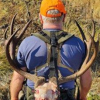Re: BCWF Mule Deer Webinar

Originally Posted by
Bugle M In

Yes, some of the area do offer Doe LEH.
And yes, a few of the Doe could be easily harvested from what i encountered.
I just hope folks with those leh tags are smart enough to leave these collared/tagged deer alone.
But i am not overly optimistic that some will unfortunately.
I worked on this project helping two of our local biologists in its early stages and helped tag a doe. Believe it or not, they specifically said if a hunter has an antlerless tag they do not want them to avoid harvesting because of a collar, they simply want it returned and recorded. Non biased approach. Based on the 2.4% mortality rate due to hunters, it appears that we are not a major issue. But there will be people who insist we shut down any doe season because they refuse to believe the science. 
There was a time I thought all parties that cared for wildlife and habitat conservation could find common ground. I was wrong. Adapt....





 Reply With Quote
Reply With Quote


